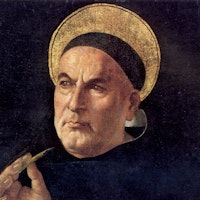Faith Is the Starting Point
Topic: Belief & Faith
But no one can understand unless he first believes; since faith is the starting-point of all knowledge…
Thomas Aquinas, born into a noble family in Roccasecca, Italy, was a renowned Dominican friar, Catholic priest, and Doctor of the Church. As an Italian Dominican, he was profoundly influential in the tradition of scholasticism, earning the titles of Doctor Angelicus and Doctor Communis. His academic journey began at the University of Naples, where he first encountered Aristotle's works that would greatly shape his future philosophical and theological perspectives. Inspired by these ideas, Aquinas joined the Dominican Order, a religious community founded by Saint Dominic dedicated to preaching and teaching.
Aquinas later traveled to Paris to pursue further studies at the prestigious University of Paris, becoming a student of Albert the Great. As a distinguished scholar and theologian, Albert the Great imparted invaluable insights that significantly influenced Aquinas's development. After concluding his studies in Paris, Aquinas returned to Italy, imparting his knowledge as a lecturer at the University of Naples and the University of Rome. In addition to his educational pursuits, he served as an advisor to the Pope, strengthening his bond with the Church.
Throughout his career, Aquinas penned numerous works, the most notable being the Summa Theologica. This extensive treatise synthesized Christian theology and philosophy, segmented into three parts that discuss God, man, and the Christian life respectively. This work, among others, solidified Aquinas's substantial impact on Catholicism, providing defensible arguments against challenges from other religious traditions and contributing significantly to the development of Catholic doctrine. The philosophy and theology of Aquinas, known as Thomism, remains influential in contemporary Catholic thought. Predicated on the reconciliation of faith and reason, Thomism has evolved with scholars like John of St. Thomas, Francisco Suarez, and Jacques Maritain further refining its principles. Its application extends beyond theology, influencing fields such as philosophy, law, economics, and facilitating dialogue between religion and science.
Summa Theologica
Aquinas, Thomas. Summa Theologica. Translated by Fathers of the English Dominican Province. Westminster, MD: Christian Classics, 1948. P. 27. Print.

Saint Thomas Aquinas
Theme: Belief and Faith


Commentary On This Saint Thomas Aquinas Quote [Short Intro Commentary]
Aquinas’s quote “no one can understand unless he first believes; since faith is the starting-point of all knowledge” explores the relationship between belief, faith, and understanding. Aquinas argues that faith precedes understanding in the order of time, but understanding precedes faith in the order of nature. This means that we must first believe in something before we can fully understand it, but our understanding of the world must also be the foundation of our faith.
[Click on “Read More” for extended commentary]
Commentary On This Saint Thomas Aquinas Quote [Extended Commentary]
Resources
Related Quotes
Copyright © 2017 – 2024 LuminaryQuotes.com About Us